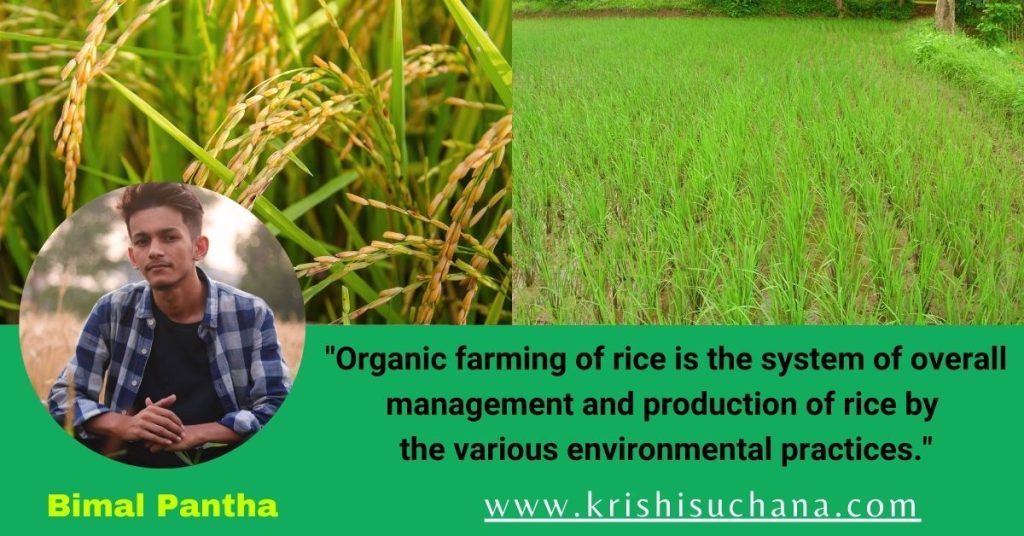Organic rice farming in Nepal and its benefits

Rice (Oryza sativa) is one of the major cereal crops in the world with about one half of population totally dependent on it. Farming of rice dates back to centuries before.
Organic farming of rice is the system of overall management and production of rice by the various environmental practices and involving different biodiversity with the aim of improving land and rice production. It is a viable alternative for the sustainable agriculture.
Organic rice farming in context of Nepal is yet to grow and enhance. Though of great importance and benefits very few farmers in Nepal have shown interest and adopted organic farming of rice. Nepal is a developing country with majority of people relying on agriculture as their major occupation. About 60 % of the total population in the country rely on agriculture. Nepalese farmers are mostly illiterate thus they are unaware about various activities and latest applications and different methods of agricultural practices which makes them to follow same method of agricultural system every season.
It is therefore important for different government agriculture bodies to aware and train farmers about various agricultural practices such as organic farming of rice. Organic farming can be of great alternative for sustainable agriculture. In organic farming the nutrient desires and other natural State for rice growth can be fulfilled by the use of organic fertilizers and Green manures and they are also greatly responsible for the improvement in soil fertility. On the other hand the use of inorganic fertilizers and other chemical compounds are unable to fulfill the plant and soil requirements thus affecting the production of rice as well as the soil.
The various statistics of increasing use of pesticides is an alarming sign to the farmers land and agricultural products. It is estimated that the use of pesticides is increasing at the rate of 10 – 20% every year and its use is widely increasing in the commercial market of crop production due to the increase in competitive market and to meet the increasing demands of people. Nepal imports 73 type of chemical fertilizers from abroad. According to a research conducted in during (1995 – 2004) it revealed that out of 1024 crops tested for pesticide, 12% of them where found contaminated with pesticides. AlThough the average national chemical use per hectare (26kg)in Nepal is less as compared to other south asian countries but its use is maximum and increasing in the commercial crop production areas. So these excessive use in the commercial production region degrade the various environmental aspect as soil and water we can say that organic rice farming is the viable alternative for rice farming.
Biofertilizers
Biofertilizers are the substances containing microorganisms whose main duty is to provide the plants, seed or soil with the necessary nutrients for their growth and improvement. Biofertilizers are one of the important component of organic farming as their role is to ensure the betterment of seed, plant and soil. Some of them are :
Cyanobacteria or Blue green algae (BGA)
Algae are the heterogenous assemblage of plants that includes prokaryotes and eukaryotic organisms. They are responsible for about 40%of total decomposition of global organic compounds. They help in nitrogen fixation which is Carried out in special thick cell called heterocysts which prevent the entry of oxygen thus able to carry anaerobic activity. BGA are to reduce the weeds and produce growth promoting substances and they also help in reclamation of alkaline soil.
The suggested method of application of the algal inoculum is broadcasting on standing water, about 3 to 4 days after transplantation. After the application of algal inoculum, the field should be kept water logged for about a week’s time. Blue green algae can be differentiated from green algae as BGA are grass green in color and they don’t react to iodine while green algae reacts.
Azolla
Azolla is an aquatic ( freshwater) heterosporous fern that occurs on five continents. When established in rice fields, Azolla also reduces water evaporation and NH3 volatilization.
Field cultivation of Azolla entails a coordinated management to obtain rapid multiplication of inocula in rice fields or in adjacent bodies of water. Azolla is first grown in small sections of the field until the surface of the water is covered, then half of the biomass is transferred to new sections. The process is then repeated.
Three different management systems are possible with Azolla. One is to cultivate Azolla as a mono crop in the field and then incorporate it into the soil before transplanting rice.The second method is to grow the fern as a cover crop with rice to either decompose naturally or to be mixed into the soil as a topdressing.The third method, which makes nitrogen continually available to the crop, is to combine mono cropping and intercropping.
Azosprillium
The genus Azospirillum colonizes in a variety of annual and perennial plants. Azospirillum can enhance the growth of field crops e.g. Helianthus annuus, carrot, oak, sugarbeet, tomato, pepper, cotton, wheat and rice. The crop yield can increase from 5-30 percent.
Liquid biofertilizer formulation
It is the liquid formulations of Azotobacter, Potash solubilizing bacteria (KSB) and Zinc solubilizing bacteria (Zn SB) biofertilizers. They can be stored and are easy to deliver in the field at the most appropriate time. They can be used for the seed treatment, root dip for the seedlings in transplanted crops and soil treatments. Inoculation with this single product can help to augment 15-20 kg N, 15-20 kg P2O5 and 5-10 kg K ha-1.
Benefits of organic rice farming
- It can be carried out at lower expenses.
- Eco friendly and ignores degradation of soil and environment.
- No contamination of pesticides on crop.
- Improvement in the quality and quantity of rice.
- Nutrients requirements of crops and soil can be fulfilled thorough organic farming.
Writer: Bimal Pantha (Student, Bsc. Ag TU )

 एउटा यस्तो विषालु भ्यागुता, जसको मुल्य नै पर्छ ३ लाख, जान्नुहाेस्
एउटा यस्तो विषालु भ्यागुता, जसको मुल्य नै पर्छ ३ लाख, जान्नुहाेस्  भोलि र पर्सि बालबालिकालाई भिटामिन ए खुवाइदै
भोलि र पर्सि बालबालिकालाई भिटामिन ए खुवाइदै  खगराज अधिकारी गण्डकीको मुख्यमन्त्री नियुक्त
खगराज अधिकारी गण्डकीको मुख्यमन्त्री नियुक्त  सुनसरीमा दुवै पक्षबीच सहमति, कर्फ्यु खुकुलो हुदै
सुनसरीमा दुवै पक्षबीच सहमति, कर्फ्यु खुकुलो हुदै  स्टेफेनको शतकमा आयरल्याण्ड वोल्भ्सले नेपाल ए लाई दियो २८५ रनको लक्ष्य
स्टेफेनको शतकमा आयरल्याण्ड वोल्भ्सले नेपाल ए लाई दियो २८५ रनको लक्ष्य 


